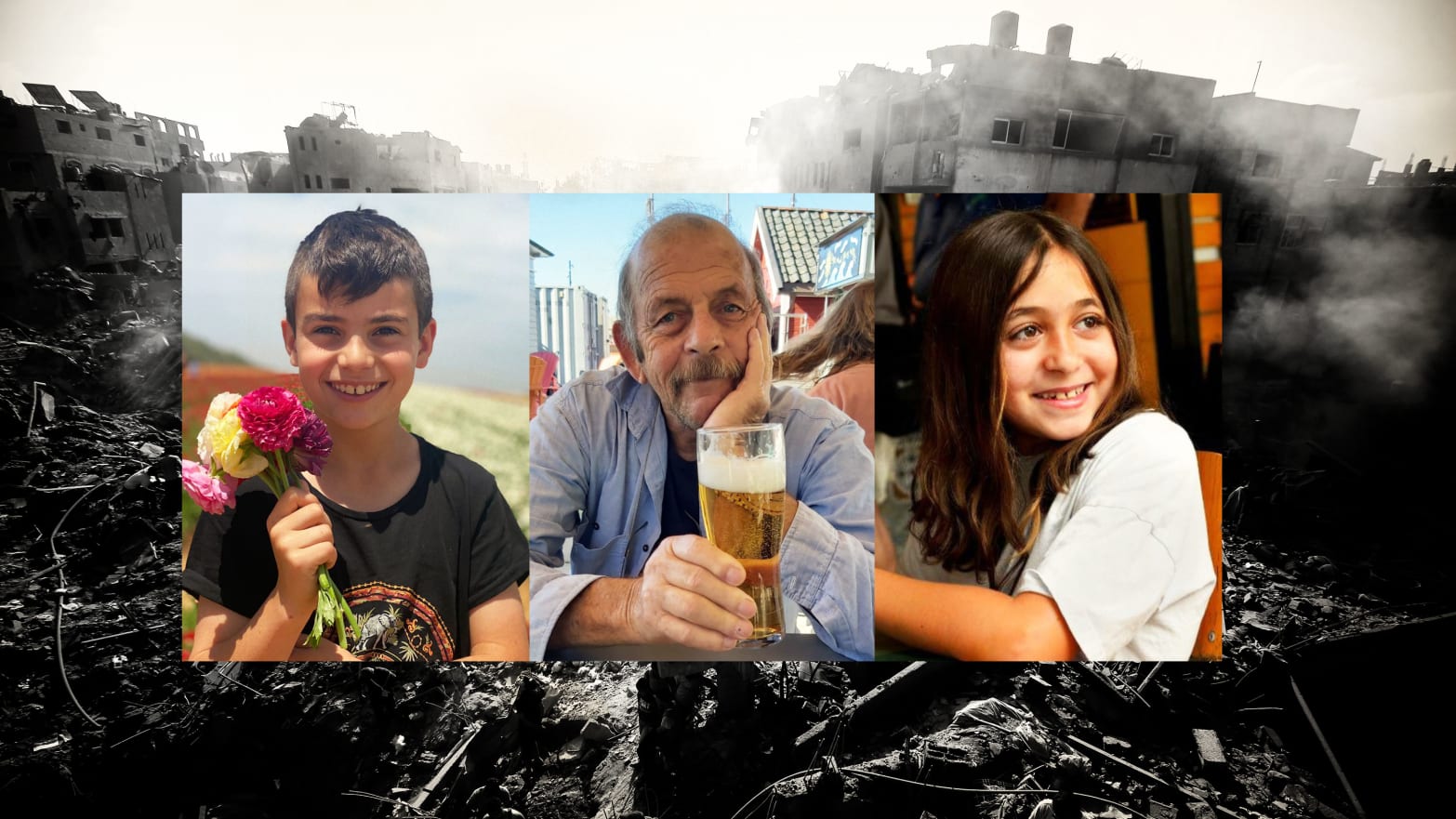Chaim Peri, an 80-year-old artist and peace activist, was in his home in Kibbutz Nir Oz, around a mile from the Gaza border, when the rocket alerts he had grown so accustomed to were interrupted by sounds he had not.
First, it was automatic gunfire. Then the sounds of men shouting in Arabic drew closer to his door. Chaim and his 70-year-old wife Osnat ran to their safe room, a bomb shelter that is found in nearly every Israeli home. They waited quietly and listened as gunmen burst through their front door. Sensing that the militants were about to open the safe room’s door—which does not lock for safety reasons—Chaim sprang it open, pushing the militants so forcefully that they left. Fearing they would be back soon with reinforcements, Osnat hid behind baskets of yarn and fabric, while Chaim stood and waited. Minutes later, Osnat watched from behind the baskets as her husband was dragged away by Hamas fighters. “Don’t resist,” she heard them tell Chaim. “We won’t hurt you.”
Chaim, a father of five and grandfather of 13, remains missing in Gaza. He is one of an estimated 230 Israeli men, women and children who were kidnapped on Oct. 7, the single deadliest day in Israel’s history. Israelis are still absorbing the pain, shock and horror of what happened that day, when Hamas fighters armed with grenades, machine guns and RPGs breached the fortified Gaza border fence, infiltrated nearly two dozen Israeli border towns, and proceeded to shoot men, women and children, in some cases raping, mutilating and burning their victims alive, according to survivors, first responders, and images uploaded by Hamas to Telegram and social media. Hamas killed an estimated 1,400 people in one day, most of them civilians who were gunned down in their homes or at a large outdoor music festival. In a tiny nation like Israel, with a population of 10 million people, the numbers are staggering. Seemingly everyone knows someone who was killed or kidnapped.
Hamas’s release of four hostages has offered some hope. Yet with more than 230 remaining inside Gaza—including children as young as 10 months old—that hope is distant. For the thousands of family members and loved ones waiting for the captives to return home, the agonizing days that have passed since their abduction have felt like years. Many fear that time is running out to bring them home alive. And, as Israel continues its campaign of airstrikes that have so far killed more than 9,000 Palestinians in Gaza, according to the Hamas-run health ministry, many fear that the hostages could also be caught in the crossfire.
“Of course I’m worried that the hostages could be affected by the airstrikes,” said Noam Peri, Chaim’s daughter, who lives on a kibbutz in central Israel, about an hour north of Gaza. She and her three children have spent much of the last three weeks in a bomb shelter, as Hamas continues to fire rockets at Israeli towns. She and her family did not know if Chaim was dead or alive until the Oct. 23 release of his friend and fellow peace activist, Yocheved Lifshitz. In a press conference following her return to Israel from Gaza, Lifshitz described the massive underground tunnel network where she and other hostages, including Chaim and her husband, were being held. While Noam and her family were relieved to hear that Chaim was indeed alive, they worry constantly about how much longer he and other hostages can last in the hands of Hamas amid the bombardment of Gaza. “We are pushing and pressuring for everything that will make Hamas release the civilians that are being held, at least the elderly and kids that are in their possession,” said Noam.
The kibbutzim—agricultural communes—that were raided are typically home to left-wing Israelis, so many of those who were killed or kidnapped by Hamas were longtime peace activists who championed the rights of Palestinians. Now, their families are painfully torn between their sympathy for innocent civilians in Gaza, their concern for the hostages, and their desire to eradicate the threat. And yet, seemingly all the hostage families agree that Hamas must be destroyed. It is a fine line many cannot articulate, and one they never expected to be walking.
“None of us are seeking revenge against innocent civilians,” said Chaim’s daughter. “But it needs to be said that the horrors that we saw from Hamas—burning families alive, slaughtering kids, shooting children in front of their parents—this can’t be treated as just another round of fighting in which Hamas fires rockets, we fire back, and then there’s a ceasefire. These are things we saw from ISIS. This is not a fight to free Palestine.”
Chaim Peri was well-attuned to the suffering of Palestinian civilians caught between Hamas’s iron grip over the Gaza strip, and the blockade Israel imposed in response to Hamas’s rocket attacks, which intensified after Israel withdrew from Gaza in 2005. As one of 3,000 volunteers with the Israeli nonprofit organization Road to Recovery, Chaim brought dozens of Palestinians from Gaza to receive medical treatment in Israel. He would drive to the Erez border crossing—which was destroyed by Hamas on Oct. 7—pick up Palestinian parents and children, drive them to Israel’s leading hospitals, wait for them to receive their treatment, then drive them back to the border. Yocheved Lifshitz, one of two elderly Israeli women released by Hamas on Oct. 23, also did this work, along with her husband Oded, who remains in Gaza. Yocheved and her husband are also from Nir Oz, and like Chaim, co-founded the kibbutz in 1955. Of just 400 residents, an estimated 180 were killed or kidnapped.
Another peace activist among the hostages is Canadian-Israeli Vivian Silver, who lived in Kibbutz Be’eri, one of the hardest hit of all the border communities. Silver, 74, co-founded with a Palestinian peace activist the Arab-Jewish Center for Equality, Empowerment and Cooperation. She also co-founded the grassroots interfaith organization Women Wage Peace, and was a board member of the Israeli human rights group B’Tselem.
This operation in Gaza is like none other before it. Not only has it claimed more lives than any previous war in Gaza, but it has a far more ambitious goal: ending the terror organization’s rule over Gaza and creating a new “security” regime, and bringing home the hostages. According to Jeremy Issacharoff, a veteran Israeli diplomat who recently retired, Hamas’s massacre of Israelis on Oct. 7 has “shattered the concept of how we have dealt with Gaza.” Now, he told The Daily Beast, Israel is embarking on what might be its most complicated mission ever. “There is a very delicate balancing act we have to pursue in terms of how we deal with Hamas, how that affects the hostages, and how we deal with Hezbollah, which is also beginning to get worse, with several attacks from Lebanon every day now. It’s going to be a very challenging task to balance all these things together.”
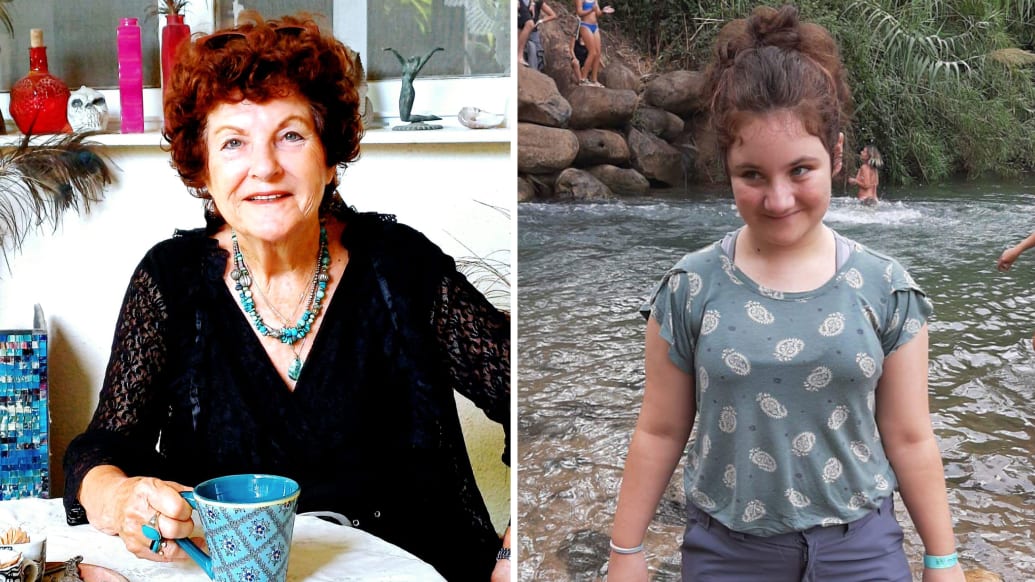
Hadas Kalderon discovered on Oct. 18 that her 80-year-old mother, Carmela Dan, (left) and her 12-year-old niece, Noya, who were thought to be held in Gaza, were found dead in Kibbutz Nir Oz.
The Daily Beast/Courtesy of Hadas Kalderon
While no one seems able to answer the question of how to destroy Hamas without inflicting catastrophe upon innocent Palestinians, hostages’ families believe the Palestinians themselves need to be freed of Hamas. “If we are going to have a future for people on both sides, there needs to be a regime in Gaza that cares for life and quality of life,” Noam told me. “We all know that the first priority of Hamas is not to take care of the Palestinian people, or to prioritize their needs.” While billions of dollars in aid have flown into Gaza ever since Israel withdrew in 2005, Hamas has failed to improve living conditions in the impoverished strip. Yet it has managed to acquire massive stockpiles of weapons and rockets, and to build hundreds of miles of subterranean tunnels with which to attack Israel and shield their own members while ordinary Palestinians pay the heaviest price. Hamas, Noam continued, had to know that Israel would not respond lightly to an attack of this scale and brutality. “In the long-term, I want innocent people on both sides to live quietly and peacefully. In the short-term, I just want my father back.”
In the meantime, she tries not to imagine what her father is enduring at the hands of his captors, who belong to a Jihadist organization whose charter calls for the destruction of Israel and the murder of Jews. Noam’s mother, Osnat Peri, is one of an estimated 200,000 Israelis who are now living as refugees, staying in hotels, guest houses and in other Israelis’ homes after being forced to evacuate their decimated communities near the Gaza border, which is still under Hamas rocket fire, and near Lebanon, where Hezbollah has been firing on northern Israeli towns since Oct. 7. Many who lived near the Gaza border have no home to return to. After butchering the people inside, Hamas set fire to the houses in the villages they invaded.
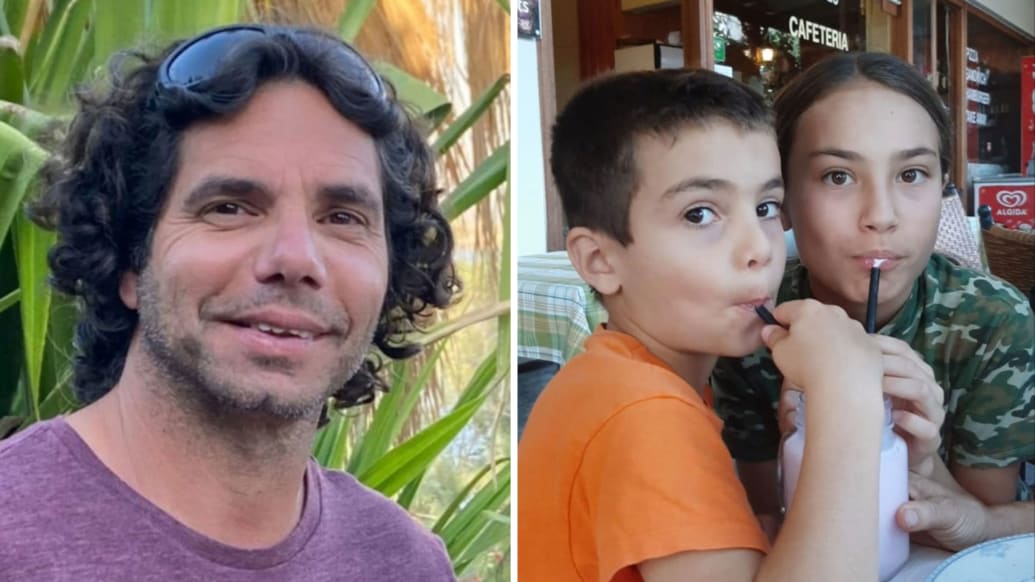
Hadas Kalderon’s ex-husband, Ofer, (left) and her children—daughter Sahar, 16, and son Erez, 12—are being held by Hamas.
The Daily Beast/Courtesy of Hadas Kalderon
Some who were thought to be among the captives have since been declared dead, as first responders continue to examine and identify the remains of those who were killed on Oct. 7. Many of the bodies were so mutilated or charred that dozens remain unidentified. Hadas Kalderon discovered on Oct. 18 that her 80-year-old mother, Carmela Dan, and her 12-year-old niece, Noya, who were thought to be captive in Gaza, were found dead in Kibbutz Nir Oz. The next morning, at a press conference organized by the Hostages and Missing Families Forum, a grassroots organization of more than 1,000 families, Kalderon fought back tears as she pleaded for the world to help bring home her son, 12, and daughter, 16, who are being held by Hamas. “I don’t have time to grieve because I have to save my children’s lives,” Kalderon cried. “Time is critical. Every moment they are there is huge danger for them. We have a very small window of opportunity now and we must use it.” While few families of the hostages have called for a ceasefire, Kalderon wants Israel to pause its military operation until the hostages are out. “You cannot make war at the expense of children and babies,” she said. “All parties should stop immediately any military acts until the release of the children and babies and elderly women and men. They must release them immediately.”
In recent days, many families have coalesced around calls for Israel to agree to what Hamas has wanted from the very beginning: an “all-for-all” agreement, which would see Hamas release all hostages in return for all Palestinians held in Israeli jails. At a meeting with Prime Minister Netanyahu on Saturday, family members of the hostages told the prime minister that “a comprehensive deal based on the ‘everyone for everyone’ principle is a deal the families would consider,” Meirav Leshem Gonen, the mother of hostage Romi Gonen, said at a press conference following the meeting. “We came with an unequivocal demand that military action takes into account the fate of the hostages and missing, and that any move considered will take into account the wellbeing of our loved ones,” she said, adding, “we all heard about the tanks going in and we’re all worried.”
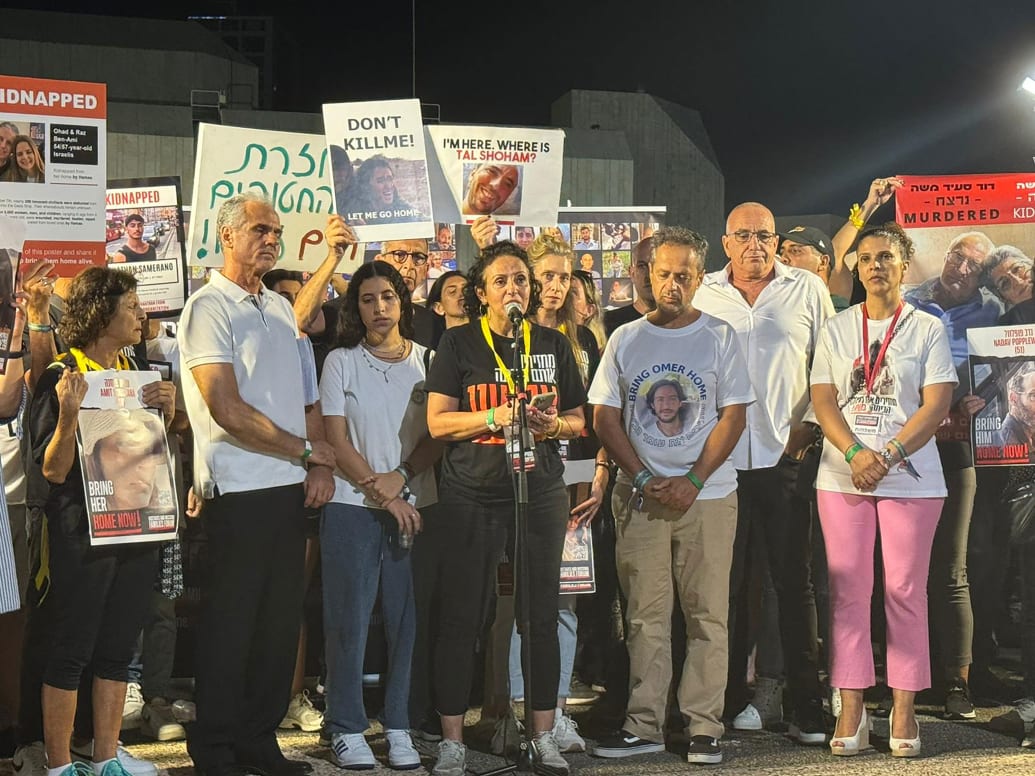
Meirav Leshem Gonen speaks at a press conference on Saturday, Oct. 28. Her daughter, Romi Gonen, 23, was kidnapped from the Nova Music Festival. She spoke to her daughter as she ran for her life.
Handout
A new poll released Tuesday by the nonpartisan Israel Democracy Institute reveals a deep divide within Israeli society on the question of releasing Palestinian prisoners in exchange for Israeli hostages. While 40 percent of Jewish Israelis support the proposal, 45 percent oppose it. Among Arab citizens of Israel, support for such a deal rises to 60.5 percent.
While the families have broad support from the Israeli public, experts say an all-for-all agreement is highly unlikely. “The release of convicted terrorists or the release of new prisoners Israel has caught in recent days would see a lot of opposition,” said Yuval Shany, a professor of international law at Jerusalem’s Hebrew University and former chair of the United Nations Human Rights Committee. Shany has represented the families of four Israelis who have been held captive by Hamas since 2014. The last time Israel agreed to a prisoner swap was in 2011, in exchange for one Israeli soldier, Gilad Shalit, who was kidnapped by Hamas in 2006. In a deal that many Israelis now regret, Israel released more than 1,000 Palestinian prisoners, many of whom were convicted of planning or carrying out terror attacks. Yahya Sinwar, the leader of Hamas in Gaza, who Israel considers responsible for the massacre on Oct. 7, was one of them. “Legally speaking, the two populations are not the same,” said Shany. “One group is civilians that Hamas has no legal right to hold. Holding these hostages is a crime in itself. Israel is detaining individuals on criminal sentences, people involved in hostilities or armed atrocities. It’s a very different equation.”
The Israeli government has thus far given no air to discussions of a prisoner exchange—at least not publicly. In a meeting with family members of the hostages on Sunday, Defense Minister Yoav Gallant dismissed Hamas’s offer as psychological warfare, telling them that military pressure was more likely to win their loved ones’ release. “If there is no military pressure on Hamas, nothing will progress,” he told them, according to a Defense Ministry statement.
On Monday, Hamas continued this psychological warfare, releasing a video of three female hostages criticizing Netanyahu, in Hebrew, and demanding that he agree to a prisoner deal.
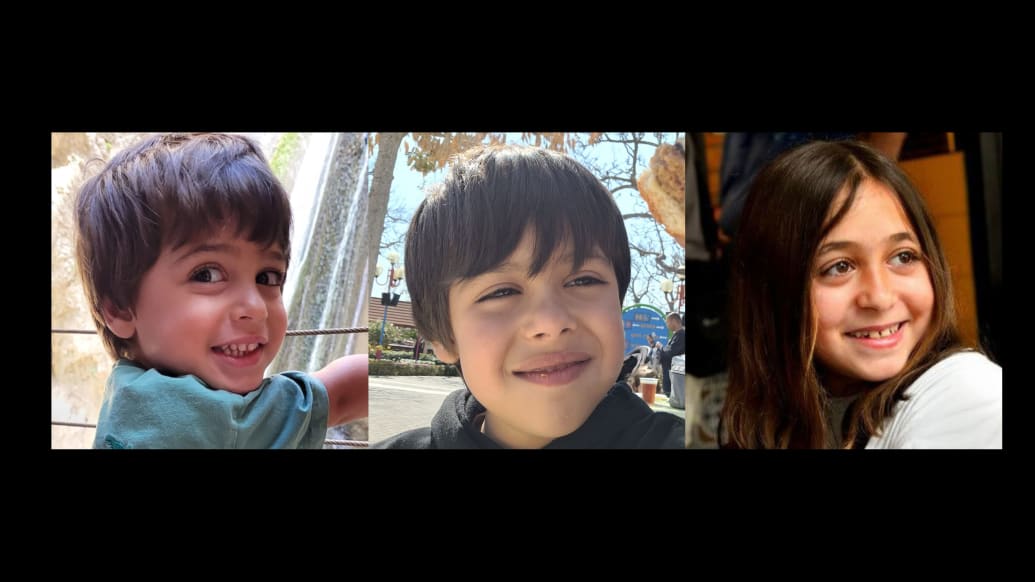
From left to right: Uriah (4), Yuval (8), and Ofri (10) were all kidnapped
The Daily Beast/Courtesy of Avihai Brodutch
After a year of anti-government protests surrounding Netanyahu’s controversial judicial reforms, a new anti-government protest has formed around the cause of the hostages. Many Israelis feel the government is not working fast enough to bring them home. The protest was sparked by Avihai Brodutch, a father and farmer who survived the deadly rampage at Kibbutz Kfar Aza. His wife and three children were taken hostage. He began a sit-in outside IDF headquarters in Tel Aviv on Oct. 14 that has since drawn thousands of Israelis, who placed photos of the hostages on the walls of the building and called for the resignation of Prime Minister Benjamin Netanyahu. Protesters chanted “Go to jail, Bibi” and held signs saying, “Bibi, you have blood on your hands.” One of the protesters was Monica Levy, who survived a Hamas suicide bombing in 1994, and whose cousin was killed on Oct. 7. “I want Benjamin Netanyahu and all his people to go home because they’ve abandoned residents of the south,” Levy told The Times of Israel. “They’re not interested in the lives of residents there and instead they’re obsessed with small politics.”
Asked what Israel should do to bring his family home, Brodutch laughed. “Ask me how to grow tomatoes,” he told The Daily Beast. “I’m not an expert negotiator. I just want my family back. I am turning to the prime minister, to those who are holding them, to America, to every world leader, to bring my family home. This should be very clear and very simple.”

